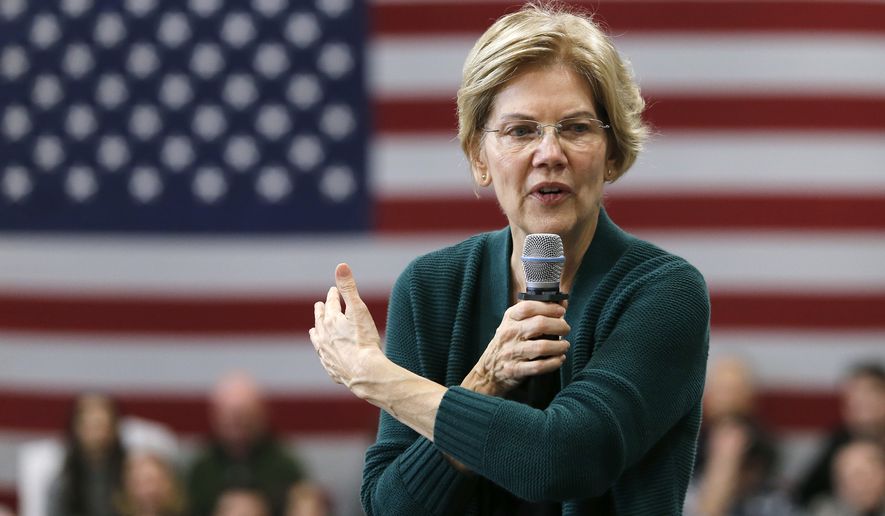OPINION:
Health care has been the number one topic in the Democratic debates. President Trump should take heed — rising health care costs and candidate fitness for leadership will dominate the 2020 campaign.
Medicare for All — as Sens. Bernie Sanders and Elizabeth Warren propose it — would cost $3 trillion a year. That’s more than double what the federal government currently raises through personal and corporate taxes. New levies on the wealthy would hardly raise that and, like ordinary Europeans, working Americans would get saddled with a national sales tax or much higher payroll taxes and be poorer in the bargain.
Americans want to keep private health insurance but want costs brought under control. Ms. Warren has come up with Plan B — resurrecting the Public Option as a politically palatable transition to socialized medicine.
Ms. Warren would enroll all folks with incomes below 200 percent of the poverty line ($51,000 for a family of four) in the public plan with opt-out provisions for those with employer-paid insurance.
Folks over 50 without private insurance would automatically be enrolled in Medicare. The rest of us could buy into the public option using what our employers currently spend on private insurance.
Competition with private insurance has merit. If Ms. Warren believes a federal agency — like the folks who designed the Affordable Care Act website or the Postal Service — can outperform CareFirst, Caremark and the rest, I’ve got my popcorn ready for a rerun of the hapless New York Giants taking on the Dallas Cowboys.
Medicare as currently structured is heavily reliant on private insurers. Most folks purchase add on policies for physician, hospitals and other expenses. Part D prescription drug premiums are collected and benefits administered through private managers as well.
Still, Ms. Warren’s program would likely bring coverage to most of the 27.5 million without health insurance owing to high costs. Unlike Republicans, Ms. Warren is eager to go after monopoly pricing and abuse of government reimbursements that require Americans to pay nearly twice as much as folks in other advanced industrialized countries for health care.
Local cartels are common among hospitals and insurers and physician-specialist groups. Pharmaceutical companies block competing new drugs and generics and rig prices. And prices for hospitals, drugs and other services are opaque and vary arbitrarily among purchasers.
Currently, 44 states attorneys general have brought suit in federal court against 20 generic-drug companies for price fixing, but much more needs to be done. Ms. Warren promises to aim the Justice Department and Federal Trade Commission on those tasks.
She proposes to use legislation already on the books to force licensing of patented drugs to generic manufacturers and establish a federal generic pharmaceutical company to manufacture drugs such as the terribly overpriced EpiPen.
Like most professors these days, the senator is for free speech for herself and those who agree with her but banishment for those who don’t. She would prohibit former government officials from working for health insurance and pharmaceutical company government-affairs departments. And she would tax corporate lobbying expenses to subsidize left-leaning community activists that advocate for anti-business, socialist regulations and legislation.
She would outright ban campaign activities by multinational companies with elements of foreign ownership — many of those are majority-owned and controlled by Americans. GM, for example, could make representations regarding fuel economy and autonomous drive standards but not Toyota’s American subsidiary or even Chrysler.
A President Warren would likely find all this stifled in courts — much like Mr. Trump’s overreach on immigration — and the whole package demonstrates what most Democrats know and don’t want to talk about.
Ms. Warren and her academic advisers who cook up most of her plans have little experience running anything other campaigns and a classroom — much as Mr. Trump and his advisers were clueless about how Washington works and the constitutional limits of the presidency.
The Democrats can only hope to win a slim majority — if that — in the Senate. Ms. Warren’s plan for a private option, Medicare for those over 50 and the much higher taxes to pay it all will face opposition from moderate Democratic senators. She would need help from Republicans.
Three of the last four presidents tried to overhaul health care with little success — the Affordable Health Care Act is proving an expensive subsidy program that does little to curb costs — and without less antagonistic strategies, Ms. Warren would suffer the same fate.
• Peter Morici is an economist and business professor at the University of Maryland, and a national columnist.




Please read our comment policy before commenting.